The economic headlines are grim almost everywhere you look. An item on Page 1 of today’s Financial Times sums things up succinctly: Growth in the US is slowing, much of Europe is in recession, China’s growth outlook has weakened, the reform processes in India have stalled and other large emerging [continue reading . . . ]
Martin Wolf, much-honored chief economics commentator of the Financial Times, has been my beacon during the financial crisis. So it is especially discouraging to read his June 6, 2012, column, headlined “Panic has become all too rational”. Wolf argues that the advanced economies are caught in a “contained depression,” that [continue reading . . . ]
Uh, oh. That’s what I find myself muttering these days when I fire up the news browser or open my morning papers. The economic news leaves me with a sense of dread. I find three developments especially worrisome: 1. Europe’s slow-motion economic crisis, now more than three years old, rumbles [continue reading . . . ]
Are America’s best days in the rear-view mirror? The Economist‘s Lexington columnist reminds us (May 12, 2012, print edition) that bouts of what it labels “declinism” are, well, almost as American as apple pie. It wasn’t so long ago that Japan was buying up iconic U.S. real estate (New York [continue reading . . . ]
The trouble with the French is that they are sick and tired of austerity, and they won’t take it any more. Oh, and by the way, they want it all. Big government, check. The French public sector accounts for more than half of the economy. Early retirement, check. Voters threw [continue reading . . . ]
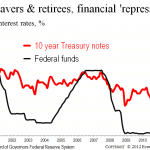
Prompted by reading, I’ve been thinking about an essay arguing that today’s exceptionally low interest rates are a form of default. The idea is far from original. Op-ed pieces in the Financial Times and the Wall Street Journal have seeded my thinking. An op-ed in today’s Wall Street Journal by [continue reading . . . ]
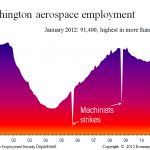
Aerospace-related manufacturing employment in Washington reached 92,300 in February. For two months running, the level has been higher than at any time in more than a decade; the last time we were in this neighborhood was November 1999, at 91,700. It is hard to overstate the importance of Boeing-related employment [continue reading . . . ]
[updated Feb. 25, see below] Is the U.S. economy finally out of the woods? Stock investors seem to think so. The time-honored (but relatively narrow) Dow Jones average of 30 industrial stocks is up by more than 14% since Nov. 25. The much broader Standard and Poor’s 500, covering America’s [continue reading . . . ]
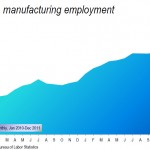
As I mentioned on KUOW’s Weekday program today, I was delighted to read in today’s Financial Times* that manufacturing employment has grown faster in the U.S. during this recovery than in any other advanced country. From January 2010, employment in U.S. factories has risen by 2.9% to nearly 11.8 million [continue reading . . . ]
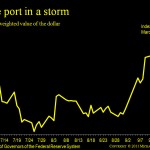
Gas at $4.00 a gallon? Gold at nearly $1,800? One of the reasons is that the value of the U.S. dollar has fallen by 38% in a decade, measured against the currencies of major trading partners. The collapse of the dollar to 97-lb. weakling status has been a drag if [continue reading . . . ]
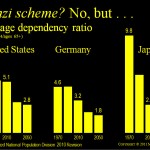
Is Social Security a Ponzi scheme, as Texas Gov. and GOP presidential candidate Rick Perry labeled it during the GOP candidates’ debate Sept. 7? The answer is “No.” Charles Ponzi gave money collected from early suckers attracted by phony promises of high returns to new suckers after taking a cut. [continue reading . . . ]
The Swiss National Bank’s surprise decision Tuesday to try to prevent the Swiss franc from rising beyond SF1.20 to the Euro may well turn out to be a key miles-marker on the road to a global depression. The Swiss franc had become one of two leading refuges for investors seeking [continue reading . . . ]